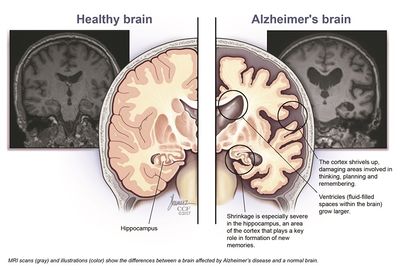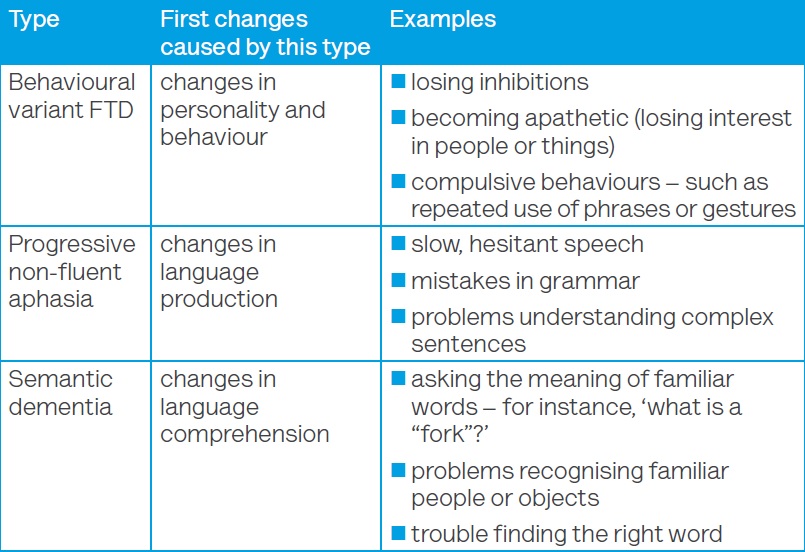How to Support a Partner Diagnosed With Frontotemporal Dementia
How to Support a Partner Diagnosed With Frontotemporal Dementia
Blog Article
Understanding the Influence of Dementia on Day-to-day Live and Caregiving
Dementia impacts daily life in extensive means, impacting not simply those detected but additionally their caretakers. As cognitive decrease proceeds, you might notice changes in interaction and routine that difficulty both parties. Understanding these changes is necessary for keeping self-respect and involvement. Yet just how do you adapt your caregiving methods to support someone traversing this complicated journey? The responses might amaze you as we explore the subtleties of this experience.
The Stages of Mental Deterioration and Their Effects on Life
As you navigate the journey of dementia, recognizing its phases can markedly influence just how you take care of everyday life. Mental deterioration typically proceeds via three primary stages: early, middle, and late.
Throughout the middle stage, you'll experience more noticeable cognitive decrease. Daily jobs could become tough, and keeping your freedom might require adjustments. Utilizing suggestions and simplifying your atmosphere can aid.
In the late stage, people frequently need substantial assistance with day-to-day tasks. Planning for care becomes crucial, concentrating on convenience and high quality of life. By understanding these phases, you're better geared up to respond proactively, guaranteeing you or your loved one can browse the challenges with dignity and elegance.

Adjustments in Communication and Social Communication
Exactly how do adjustments in interaction influence your daily interactions as mental deterioration proceeds? As dementia advances, you could discover that straightforward discussions become tough.
You may discover it easier to attach via these methods as opposed to relying only on spoken language. Listening skills can also alter; you may discover it harder to adhere to conversations or remember what was just claimed (Fall Risk). This can result in misunderstandings or sensations of isolation
Encouraging perseverance and developing a supportive setting can assist. Participating in tasks that promote connection, like music or art, can boost social communications. Bear in mind, keeping partnerships is still possible; it's just about adjusting to brand-new means of interacting.
Effect on Daily Routines and Activities
While maneuvering day-to-day routines, you'll likely see that jobs you when finished effortlessly come to be extra tough as dementia progresses. Basic tasks like food preparation, clothing, and even bathing might require even more time and initiative. You could find yourself forgetting action in acquainted regimens or struggling to remember where you put items. This can result in stress not just for you, yet likewise for those around you.
Planning your day can really feel overwhelming, making it more difficult to adhere to a routine. You may require tips for consultations or to take medications. Adapting your atmosphere can aid; as an example, labeling products or utilizing checklists can simplify jobs. Involving in repetitive, organized tasks can additionally supply comfort and a sense of accomplishment. Bear in mind, it's all right to ask for aid. Surrounding yourself with encouraging friends or household can make handling these adjustments a bit easier.
Behavior and emotional Challenges
Steering via day-to-day regimens can cause not simply functional obstacles, yet behavioral and additionally emotional ones. You might see adjustments in mood, such as raised stress and anxiety or irritation, which can originate from complication or problem in finishing tasks. As you navigate these minutes, it is important to recognize that your loved one may express their sensations through behaviors like anxiety or withdrawal.
These psychological reactions can be unpredictable and may occur without warning, leaving you both feeling overwhelmed. You could find that familiar settings or regimens can aid minimize anxiety, yet keeping persistence comes to be substantial. It is crucial to verify their sensations, also if you do not fully understand them.
The Duty of Caregivers in Supporting People With Dementia
As a caretaker, you play a vital role in offering emotional assistance for people with dementia. Establishing daily care routines can create a feeling of stability and convenience, assisting to ease their anxiety. By comprehending their requirements and using efficient techniques, you can considerably improve their lifestyle.
Emotional Support Strategies
When looking after someone with dementia, understanding the psychological landscape is vital for providing reliable assistance. You'll commonly locate that perseverance and empathy go a lengthy way. Validate their feelings; if they reveal complication or stress, recognize it without disregarding their feelings. Basic motions, like holding their hand or maintaining eye contact, can create a complacency. Try to involve in activities that they take pleasure in, as this can spark delight and connection. Bear in mind to communicate clearly and gradually, utilizing a calm tone. Urge expression via songs or art, which can function as a powerful outlet. Ultimately, don't forget to look after your own psychological needs; seeking support on your own can enhance your capacity to care for them.
Daily Treatment Routines
Establishing everyday treatment routines is important for giving stability and comfort to individuals with dementia, as these routines can help in reducing complication and stress and anxiety. You can begin by describing a constant timetable for dishes, tasks, and rest. This predictability assists your liked one really feel a lot more protected and engaged.
Incorporate acquainted tasks, like folding washing or watering plants, which can evoke positive memories and cultivate a feeling of achievement. Use visual hints, such as lists or schedules, to assist them through the day.
Be flexible, though; adapt routines as required based upon their state of mind or power levels. Vascular Dementia. Remember, your persistence and understanding are crucial in maneuvering their changing demands, guaranteeing they really feel supported and valued throughout their life
Creating a Safe and Comfy Living Environment
Producing a comfortable and safe living setting is essential for people with dementia. You'll intend to make home security alterations that minimize dangers and assure familiarity to give a sense of convenience. By concentrating on these elements, you can help develop a space that sustains both security and wellness.
Home Security Alterations
As you browse the obstacles of dementia, making home safety and security adjustments can significantly improve convenience and security. Begin by removing tripping hazards like carpets and mess, assuring sidewalks are clear. Install grab bars in restrooms and non-slip floor coverings in the shower to protect against falls. Take into consideration making use of brighter illumination and evening lights to boost exposure, especially throughout nighttime. Tag important locations, such as the bathroom and cooking area, with clear indicators to assist with positioning. Protect any type of sharp objects or harmful substances out of reach. In addition, evaluate your home's locks and alarm systems to confirm they're easy to use and offer comfort. These alterations not only advertise security however additionally urge freedom, permitting your liked one to feel more comfortable in their environment.
Convenience and Knowledge
After making certain a secure setting with needed alterations, fostering convenience and experience is necessary for individuals Vascular Dementia with dementia. Maintain a constant routine to assist them feel based and reduce stress and anxiety. Involving in familiar tasks, such as listening to songs or gardening, can improve their sense of belonging, making their living atmosphere a real shelter.
Techniques for Reliable Caregiving and Assistance
While steering the challenges of dementia care can really feel overwhelming, executing efficient techniques can significantly improve both the caregiver's and the patient's day-to-day experience. Start by establishing a regimen; predictability assists reduce stress and anxiety for both you and your liked one. Use clear, simple interaction-- direct inquiries and short sentences can prevent confusion.

Don't forget to take treatment of on your own; routine breaks and get in touch with support teams. Sharing experiences with others in comparable circumstances can offer beneficial understandings and emotional relief.
Finally, continue to be client and flexible. Dementia can bring uncertain changes, so adapting your technique is crucial. By employing these approaches, you can promote an extra favorable atmosphere that profits both you and your enjoyed one.
Often Asked Concerns

What Are the Different Kinds of Mental Deterioration?
You'll discover several kinds of dementia, consisting of Alzheimer's, vascular dementia, Lewy body dementia, and frontotemporal mental deterioration. Each type affects memory and cognitive function in different ways, so comprehending the distinctions is necessary for appropriate diagnosis and treatment.
Exactly How Can I Assist Someone With Early-Stage Dementia?
You can aid somebody with early-stage mental deterioration by being person, providing assistance, and encouraging them to take part in activities they delight in. Keeping regimens constant and maintaining open communication can also make a substantial distinction in their day-to-day live.
Exist Financial Resources Available for Dementia Care?
Yes, there are financial resources offered for dementia care. You can discover government help programs, not-for-profit companies, and insurance policy alternatives. It's also smart to get in touch with local agencies for details sources tailored to your circumstance.
What Legal Considerations Should Caregivers Know?
As a caregiver, you need to consider power of attorney, health care proxies, and guardianship laws. It's important to understand the lawful civil liberties and responsibilities you hold, ensuring your enjoyed one gets appropriate treatment and defense.
Just How Can I Handle Caretaker Tension?
You can handle caregiver tension by prioritizing self-care, looking for support from buddies or groups, establishing sensible assumptions, taking breaks, and exercising leisure methods. Bear in mind, your well-being matters simply as long as the individual you're caring for.
Recognizing the Effect of Dementia on Daily Life and Caregiving.
As you navigate the trip of mental deterioration, recognizing its stages can significantly affect exactly how you take care of daily life.While maneuvering daily regimens, you'll likely notice that tasks you when finished effortlessly come to be extra difficult as dementia progresses.Developing day-to-day treatment regimens is necessary for offering security and convenience to individuals with dementia, as these routines can help minimize confusion and stress and anxiety.While steering the challenges of mental deterioration care can feel frustrating, carrying out reliable strategies can greatly enhance both the caretaker's and the individual's daily experience.
Report this page